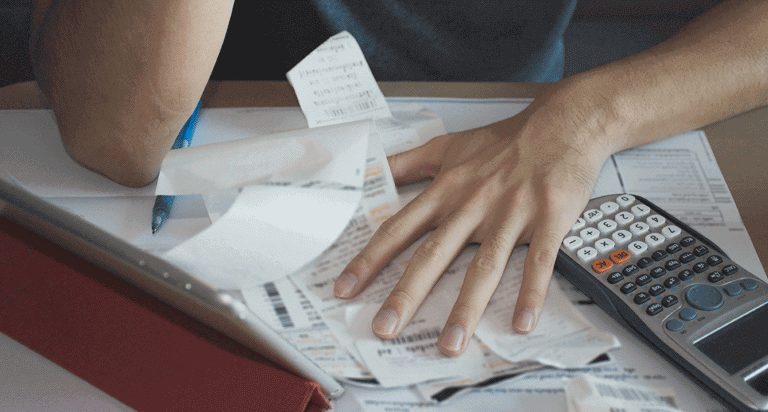How to Catch Up When You’ve Fallen Behind on Paying Your Bills


Highlights:
- If you're facing multiple overdue bills, prioritize paying your necessary expenses first. These are the things that keep your household running such as mortgage or rent, car payments, groceries and utilities.
- When you've met your day-to-day expenses, focus next on bills that have the highest interest rates, fees and penalties.
- If you're struggling to pay what you owe, contact your creditors directly. Some may be willing to work with you to help you catch up on what you owe.
Falling behind on your bills can be extremely stressful, but it's important to face missed payments head-on. If you're feeling overwhelmed by unpaid bills, interest, late fees and more, these six steps can help you get back on track.
1. Create a list of your bills
Make a master list of all your bills, including their due dates and the amounts you owe along with any interest rates and penalties. When do you have to pay your utility bill? Which missed payments will result in a late fee? Which overdue balances are accruing interest and causing more debt? This list can answer all of your questions at a single glance and help you organize your repayment efforts.
2. Prioritize missed payments
If you're facing multiple overdue bills, you may be unable to tackle them all at once. So, you'll need to choose which bills must be paid immediately and which can wait a little longer.
Consult your list of bills and order each payment according to its importance. Begin with your necessary expenses, which are the bills you must pay in order to keep your household running. These generally include your rent or mortgage, car payments, groceries and utilities. Plan to allocate your income to these expenses first before you move on to your loans, credit cards and other debts.
3. Pay bills with the highest interest rates
Next, focus on repaying the bills with the highest interest rates, fees and penalties. With this debt repayment strategy — also known as the avalanche method — you'll pay your debts in order from the highest to the lowest interest rate. Since interest continues to accrue over time, targeting high-interest debt first may help you save money in the long run. Even a small percentage difference can impact the amount of interest you pay on a loan.
Expect your credit cards, which typically feature double-digit interest rates, to be among your priciest debts. Federal student loans and secured loans, including mortgages and auto loans, usually have the lowest interest rates.
If you're struggling to pay what you owe, contact your creditors immediately. Some may offer customized repayment plans that can reduce your monthly bills, lower your interest rates or waive fees and penalties.
4. Create a budget and track your spending
As you work to catch up on bill payments, it's important to look at your monthly budget. How much cash comes into your household each month and how much goes out?
If you don't already have a budget, begin by listing both your income and your expenses. Sort your expenses into necessary costs (such as rent, groceries and debt payments) and discretionary ones (non-essential spending, such as entertainment and travel). While you're catching up on your unpaid bills, reduce or eliminate your discretionary expenses. When possible, put leftover money directly toward your past-due bills.
Even when you're completely debt-free, you can continue to use your budget to track your spending. Regularly review your expenses to identify potentially harmful spending patterns. Look to cut down on frivolous purchases and ensure that your money goes where it's needed most.
5. Watch out for debt relief scams
Agencies such as debt settlement companies sometimes offer help managing unruly debt. They may promise to renegotiate or change the terms of your debt for a substantial fee, but their claims can be misleading. Before you agree to a settlement, read the terms carefully and consider less expensive alternatives such as nonprofit credit counseling agencies. These organizations often provide the same or similar services for little to no cost.
6. Consider financial assistance programs
If you find you often need help paying your bills, consider these special aid options:
- Repayment plans. Need help paying your cell phone bills? Can't make your credit card's minimum payment? Speak directly with your creditors. Some may be willing to work with you to ensure they receive partial payments. Start by explaining your financial situation and then ask for information about repayment plans or hardship programs.
- SNAP and WIC. If you're struggling to afford groceries, you may be able to qualify for food assistance. Programs such as SNAP (for low-income adults and families) and WIC (for low-income pregnant women and children) provide access to helpful food benefits. Qualifications for these programs vary by state, so refer to usa.gov/food-help for more information.
- Medicaid. If you have limited income, need help paying healthcare expenses and qualify, Medicaid may cover some of your costs. Medicaid is a publicly funded program that helps pay for many common healthcare services.
- Mortgage and rental assistance. If you can't make your mortgage or rent payments, seek out a HUD-approved counselor for free or low-cost guidance. You may be eligible for public housing, mortgage forbearance or other forms of aid.
No one wants to fall behind on their bills. However, if you do get off track, don't panic. Reviewing your situation — with the goal of balancing your income and expenses and better managing your debts — can help you catch up and pave the way for a brighter financial future.
Get your free credit score today!
We get it, credit scores are important. A monthly free credit score & Equifax credit report are available with Equifax Core CreditTM. No credit card required.



